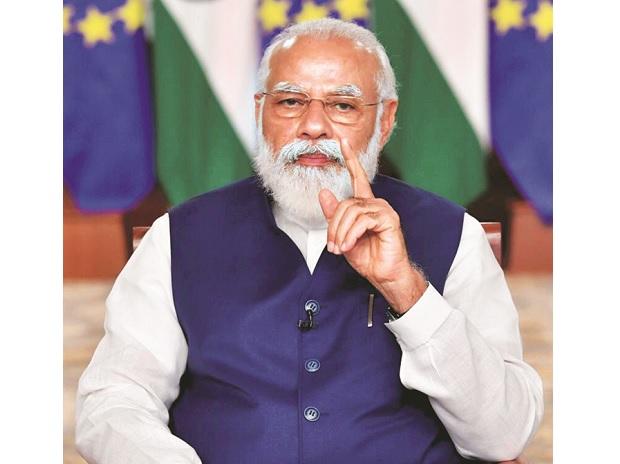Prime Minister Narendra Modi on Monday called for an all-party meeting of parliamentary floor leaders on Friday to discuss issues related to the spread of the Covid-19 pandemic and the roll-out of a vaccine.
This is one government meeting Opposition parties will not roll up their sleeves for. Somewhat surprisingly for India, leaders say there must be no politics around the infection, or the vaccine.
A blame game has broken out between the Aam Aadmi Party (AAP), which is in power in Delhi, and the Bharatiya Janata Party (BJP), which has lashed out at AAP for being lax in preventing the spread of the infection in the national capital.
However, one of the BJP’s most bitter critics, Bengal Chief Minister Mamata Banerji, has declared the state government will collaborate with the Centre in distributing the vaccine, though she could not resist taking a jibe that the Centre was counting its chickens before they are hatched.
“They are indulging in such a big talk about the vaccine but no one knows when the vaccine will come. For the past few months, they have been busy delivering speeches,” she told reporters last week in Kolkata. Elections are due in Bengal in the first half of 2021, and Banerji is apparently fighting the temptation of dragging the vaccine into the election.
“There must be no politics around the vaccine,” says former Union minister and Congress leader Jairam Ramesh. “We’re very clear. The frontline health workers must be vaccinated first, followed by persons who are most vulnerable to the disease.”
Ramesh, who was associated intimately with the technology mission for immunisation launched in 1986, concedes that that programme was limited to 25 million people — pregnant women and children. But the challenges were still daunting nonetheless. “I remember endless discussion with Voltas about exactly the same issue we’re discussing now — a cold chain,” he says.
Ramesh says the onus is also on the Centre to realise that “this has to be a professional execution. It cannot be a political exercise”. He concedes that everyone is groping in the dark: “If reports are correct that the Pfizer and the Moderna vaccine need to be stored at minus 70 degrees Celsius temperature, these will not be appropriate for India. Obviously, the choice of the vaccine will determine its cost.”
Leaders across parties are thinking hard about ways in which the roll out can be most effective. Jaiveer Shergill of the Congress says the government needs to tap the Election Commission of India to take lessons on universalising the vaccine.
“The ECI has done extensive work on reaching the last man to ensure voting. For instance, the guiding principle is that there must be a polling booth within 3 km of a voter’s residence. The same principle could be applied to administer the vaccine,” he says.
Ramesh says the polio vaccine (which was admittedly easier to administer because it was an oral vaccine in contrast to the Covid-19 one, which will need to be injected) was given both via India’s 25,000 Primary Health Centres (PHCs) and through outreach. “There cannot be a set template. The government will have to take state governments on board,” he says.
However, there is no unanimity on the cost and how the vaccine will be funded. “In Bihar, the BJP said it will provide the vaccine free of charge. What is good for a Bihar election must be good for the rest of the country, even if there is no election,” Ramesh says. However, he adds that those who can pay, should. He believes that a Covid-19 cess on certain transactions might be a way of funding the vaccine, at least partially.
Ramesh is clear that the government must immediately halt wasteful, avoidable expenditure like the building a new Parliament, redesigning Delhi’s Central Vista and building a museum for Prime Ministers, saying this is not the time to throw money at vanity projects. “India is going to spend Rs 25,000 crore on these projects. That’s a lot of money. We need that money to protect the health of Indians,” he says.
 Dear Reader,
Dear Reader,
Business Standard has always strived hard to provide up-to-date information and commentary on developments that are of interest to you and have wider political and economic implications for the country and the world. Your encouragement and constant feedback on how to improve our offering have only made our resolve and commitment to these ideals stronger. Even during these difficult times arising out of Covid-19, we continue to remain committed to keeping you informed and updated with credible news, authoritative views and incisive commentary on topical issues of relevance.
We, however, have a request.
As we battle the economic impact of the pandemic, we need your support even more, so that we can continue to offer you more quality content. Our subscription model has seen an encouraging response from many of you, who have subscribed to our online content. More subscription to our online content can only help us achieve the goals of offering you even better and more relevant content. We believe in free, fair and credible journalism. Your support through more subscriptions can help us practise the journalism to which we are committed.
Support quality journalism and subscribe to Business Standard.
Digital Editor

RECOMMENDED FOR YOU